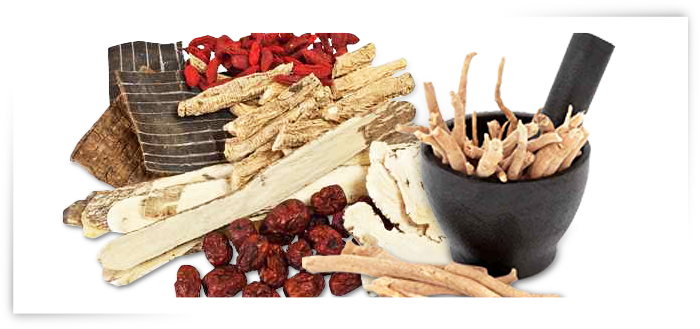
WHAT IS CHINESE HERBAL MEDICINE?
Chinese medicines, including herbs, processed herbal materials and patent prescriptions, are medications prescribed under the guidance of TCM theory. Prior to Qing Dynasty, Chinese medicine was referred to as materia medica or raw medicine.
Since the majority of Chinese medicines are plant-based, it is also termed Chinese herbal medicine.
In fact, animal products and minerals are used in prescriptions as well. Sometimes simple processing is required, such as the preparation of indigo and gelatinum asini.
What is decoction (brewing herbs)?
In Chinese medicine, decoction is a mean of herb preparation involving first soaking, then boiling in ceramic pot, and lastly straining.
To maximize the efficacy of the herbs when brewing, some are added early, some latter; some are bagged, some need to be melted first. Some others are to be dissolved in water and taken directly without boiling.
Generally speaking, minerals and crustaceans, such as fossil fragment (LongGu) and ostrea (MuLi), need to be boiled first; aromatic herbs with volatile properties, such as peppermint (BoHe), Herba Schizonepetae (JingHuiJie), Agastache Rugosus (HuoXiang), need to be boiled later to prevent loss of medicinal efficacy; a few other ingredients, such as pearl powder (ZhenZhuFen) or “raw powder”, can be grinded down to powder for oral intake or added to the concoction.
What is the difference between decoction and scientific Chinese medicine?
There’s no hierarchy among decoction, pill, and powder. They are various forms of medicine administered to patients according to the conditions.
Currently, manufacturing procedure for scientific Chinese medicine is the same as decoction. It also undergoes boiling process to extract active ingredients from the herbs, which are then concentrated to form scientific Chinese medicine. It is safe, effective, portable and convenient, thus, widely accepted by the general public. In most cases, scientific Chinese medicine along is sufficient for treatment.
For other critical or complex cases, decoction may be more appropriate. The physician will prescribe suitable formula based on patient’s constitution and illness. When it comes to decoction, there is a wide selection of herbs with excellent potency, efficacy and bioavailability. The physician can also adjust the formula anytime to coincide with changes in the progression of illness and patient constitution, allowing maximal efficacy of the herbs.
How to brew and administer the medicine?
Equipment:
Glazed clay herb cooker is the best choice, but any ceramic, stainless steel will do. Do not use a container that’s made out of cast iron, aluminum or copper.
Soak the herbs:
Lightly rinse the herbs and soak in adequate amount of water (fully cover the herbs). Allow the herbs to soak for 30-60 minutes. Do not discard the water. Save it for boiling.
Amount of water
Apply moderate pressure to the herb, and make sure the water covers the herbs by 2cm for the first decoction. After the initial decoction is completed, pour the fluid through a strainer, add more water in the pot for second decoction. This time the water only needs to cover the herbs by 0.5-1cm. Add more boiling water as needed during the process.
Boil and Simmer:
The most common method of brewing a decoction is to decoct the ingredients twice. Bring the water to a rolling boil, then bring down the heat and simmer for 20 minutes. Strain the fluid, and keep herbs in the pot for second decoction. Add water, and bring it to boil again. Simmer for 15 minutes. Strain the fluid and add it to those from the initial decoction. Mix well.
*Special instructions:
“Boil first”: To increased herbal solubility or reduce toxicity. Usually boil the herb first for 20 minutes.
e.g. Turtle shell (BieJia), tortoise shell (GuiBan), Gypsum fibrosum (ShiGao), fossil fragments (LongGu), etc. Aconitum (FuZi) needs to be boiled first for 30-60mins (to reduce the toxicity).
“Boil later”: To reduce loss of volatile oil and active ingredients. Do not add the herb until the last 3-5 minutes.
e.g. Agastache rugosus (HuoXiang), Eupatorium (PeiLa), Peppermint (BoHe), Reum officinale (DaHuang), etc.
“Melt”: Herbs containing large amount of gelatin or viscosity will normally melt easily with heat.
e.g. Colla corii asini (EJiao), Antler gelatin (LuJiaoJiao) and Tortoise-plastron gelatin (GuiBanJiao).
“Dissolve”: To be dissolved in water and taken directly. Boiling is inappropriate in this case, due to high volatility of the herbs.
e.g. Anredera cordifolia (ChuanQ) (grind to powder), Cinnamomum cassia (RouGui) (grind to powder).
Usage:
Follow physician’s instructions; typically take the medicine 3 times a day— pre-prandial, post-prandial and at bedtime. As a rule of thumb, regular medicine should be taken an hour after meal; nourishing medicine should be taken before meal; stomach aggravating medicine should be taken after meal; narcotics should be taken at bedtime.
Foods to avoid:
While taking the medicine, avoid raw, cold, greasy and spicy food that may affect absorption of medicine. Other medications should be taken at least 30 minutes apart. If you are not feeling well, you may stop the medicine and contact your physician to report adverse responses for appropriate formula adjustments.
How do I go about buying herbal decoction?
Please follow the prescription from certified TCM physicians. Do not self medicate.
There are thousands of different Chinese herbs. It is difficult for one to fully master the knowledge of all herbs. Please be advised that it is best to purchase herbs from reputable and trustworthy Chinese medicine shops. The safety of Chinese herbal medicine can only be ensured through appropriate processing, free of chemical additives and utilization of authentic ingredients.
Can I order Chinese herbs from Ma Kuang?
Ma Kuang provides door-to-door delivery service. Your prescription from our certified TCM physician will be filled at Wong Yiu Nam Medical Hall. You can pick up the herbs at Ma Kuang or request delivery to your doorstep.